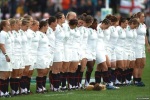There has been much publicity surrounding the centenary of the football match that interrupted fighting in the trenches during WW1. Indeed, Sainsbury’s have used the story in its Christmas advertising. I was intrigued by a news story last week that presents another, less well known part of football’s history from the war years.
As a generation of young men signed up to fight, the women who were left behind took up employment in the factories – in many cases coming out of the home into the workplace for the first time. The factories in which they worked previously had football teams, constituting much of the professional game before the war.
Beginning with informal kickabouts, it wasn’t long before the women became more serious about the game and challenge matches were put on between factory teams. Up until this time, football was considered a wholly unsuitable pastime for women; it was neither necessary for them to have such physical exertion and was also thought to be “unladylike and somewhat immoral”.
However, as the war progressed, the women’s game became formalised, with teams from the munitions factories playing competitively and in 1917 the Munitionette’s Cup was inaugurated. Large crowds watched the games and as the war progressed, more teams were started and people began to recognise the women’s game for the skill and ability of the women, rather than for any other spectacle.
Dick, Kerr Ladies FC from Preston, founded in 1917, regularly drew crowds in excess of 10,000 people. In fact, on Boxing Day 1920 their match against St Helen’s Ladies was watched by a crowd of 53,000.
Once the war over, the factory workforce once again became male and women who had become the main providers for four years, found themselves fulfilling the same role they had been in before the war. For many, going back into the home was considered the “right and proper place” for women and on 5 December 1921 the Football Association bowed under growing pressure, insisting that their members should no longer permit women to use of their grounds, which effectively close that chapter of women’s football.
Today however, women’s football is once again in he news and on 23 November 2014 at Wembley stadium a crowd of 45,000 watched England’s women play against Germany.
Football is not the only team sport where women are in the headlines. On Sunday the England Women’s Rugby Union team was awarded the BBC accolade of “Team of the Year” for 2014 and the England women’s cricket team won the Ashes in 2014, when the men so spectacularly failed. Now all they have to do is persuade the schedulers and the sponsors, that their games are worthy of mainstream television deals and equal prize money.
It is clear that women are finding room for themselves and, more frequently, in traditionally male the spaces like the sports-field. But how does this compare with the workplace or the boardroom? Have women achieved in the same way, or do they still have to fight for the right to be there, as managers and senior executives. Who are the proverbial schedulers and sponsors of women in the workplace, because it is certainly time for increased presence and equal reward – after all the FA removed their ban in 1971.



Reblogged this on My Blog.
I do think that the insessant campaigning for women’s rights is at times diluting the argument. Whilst the statistics of female board members (and senior roles in organisations) is yet to compare with males, the picture is changing and womens prominence will continue to build momentum, rightly so. Cultural change however does not happen overnight, and people should be allowed to formulate their own views, and move at their own pace, this is their right. People’s opinions should always be respected, but I have no problem in challenging inappropriate behaviours and actions, because they impact other people.
I don’t like reading about quota systems in sport or in business, I firmly believe in meritocracy. I have more admiration for people who achieve their goals through skill and determination than I would for those benefiting from forced measures like some that are being proposed. The equal pay debate in sport for females is in my view quite ridiculous. Market forces should dictate levels of remuneration, or put another way, why should females achieve equal reward in sports where the world hat large currently has little interest compared to the male equivalent (and visa versa by the way). So Dame Kelly Holmes for example deserves in my view absolute parity and more because of her popularity and undoubted achievements, and there are countless other examples in sport, business, politics, humanity, as many as men I am sure. Whuilst I don’t know the facts, I would expect and hope that great actresses like Dame Judi Dench, Meryl Streep and the likes receive comparable rewards to their male counterparts.
So, whilst I do understand the motives, and we can all reflect of the “arguably” great work of Emiline Pankhurst and the Suffragette movement, I think a lot of the “hard yards” have been done for women’s rights. I am not suggesting that campaigning shouldn’t continue to help maintain momentum, more that arguments should not be biased as this is the very thing that is being opposed.
It all reminds me of the quote “when god made man she was only joking”,